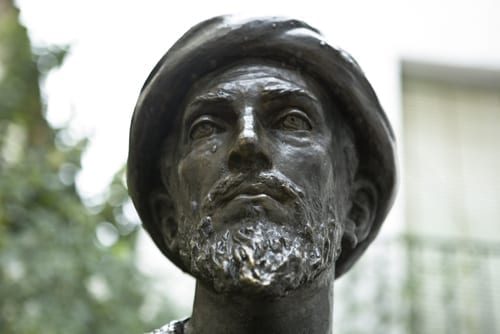
The reformist Jewish rejection of normative Judaism that emerged out of the Enlightenment/Haskalah included the patently absurd attempt to transform the Rambam into a free-thinking maskil. Threatened by his brilliance and authority, post-Enlightenment Jewish thinkers sought to recast this matchless proponent of Halachah as a heretical philosopher. Maimonides, they inanely argued, actually rejected Halachah, and only presented a normative Jewish viewpoint as a literary ploy to conceal his philosophical ideas, which were antithetical to Jewish tradition.
These secularists, who placed the Rambam within a Eurocentric philosophical context and distorted his ideas to reflect an irreligious perspective, focused primarily on his treatise Moreh Nevuchim, the Guide for the Perplexed. The Rambam’s magnum opus, his compendium of Jewish law, the Mishneh Torah, was for the most part ignored by them.
With the emergence of Zionism came a change of focus. In a new attempt to recast the Rambam, this time within a Zionistic nationalist context, Jewish nationalists— particularly of the religious stripe—scrutinized the Mishneh Torah with the same vigor as the Maskilim once dissected the Moreh Nevuchim. What they accomplished is that the Mishneh Torah is now equally distorted.
Scholars who idealize Jewish sovereignty, no matter what the nature of that dominion—religious, heretical or even despotic—are out to prove that the Rambam was of like mind. To support their argument that Maimonides believed that Jewish autonomy practically supersedes all other values, they have engaged in various creative readings of his words. One of their oft-cited “proofs” is the Rambam’s statement at the beginning of Hilchos Chanukah in which he summarizes the history of the Hasmonean era that emerged from the miraculous victory we celebrate on that holiday. They interpret his words to mean that regardless of the total disregard of the Hasmonean kings for religion and human rights, as long as those despots were of Jewish lineage we should be pleased about their ascendancy.
Specifically, they point out two failings of the Hasmonean rulers that the Rambam seems to forgive. In Hilchos Melachim, the Rambam rules that it is forbidden to appoint a king who is not a descendent of King Shlomo. Yet in Hilchos Chanukah he emphasizes twice that the Hamoneans were kohanim, and anointed a kohen as king. And despite the fact that the majority of its kings were Sadducees, Hellenists and idolators, the Rambam notes that the Hasmonean kingdom continued for more than 200 years. (Indeed, Chazal tell us that 103 of those years were under the rule of descendants of the wicked Herod and his family.)
They therefore conclude that the Rambam is of the opinion that Jewish national independence is so important that it is better to have an irreligious and corrupt Jewish government—even one that is hostile to Judaism—than none at all. This interpretation, however, that the Rambam made a distinction between a Jewish despot or idolater and a non-Jewish one, is anathema to everything the Rambam stood for.
The Rambam’s stringent views on Jewish heretics and his rulings regarding them do not have to be repeated here. What is worthwhile to point out is that the Rambam hardly believed that a Jew is special because of his pedigree, as he repeatedly emphasized that what renders a person worthy to be considered a Jew is primarily his adherence to Jewish teachings. That is why a convert to Judaism is so warmly embraced by the Rambam, and why an apostate is dealt with so harshly.
Chazal state that the Jewish nation is distinguished in three ways. Like our forefather Avraham, they are compassionate, shy and benevolent. The Rambam, however, attributes these qualities solely to their adherence to Avraham Avinu’s teachings, rather than DNA.
In fact, the Rambam’s words in Hilchos Chanukah are not contradictory, as he is merely reciting history without offering any opinion about those events. He most certainly doesn’t say that we celebrate Chanukah because of occurrences that happened many years after the fact. (In halachah 3, where the Rambam writes, “Therefore, etc.,” he is plainly referring to halachah 2—not what was stated back in halachah 1).
Few of our secular brethren realize that by venerating Jewish nature rather than nurture, Jewish race instead of Jewish teachings, they are promulgating a wholly racist ideology
